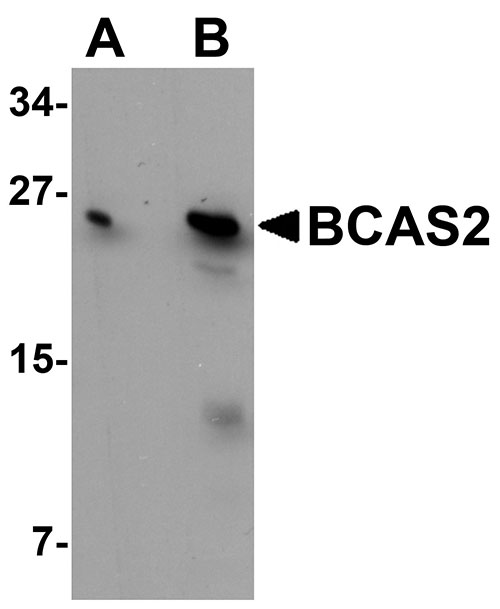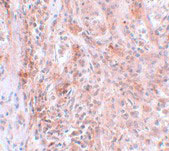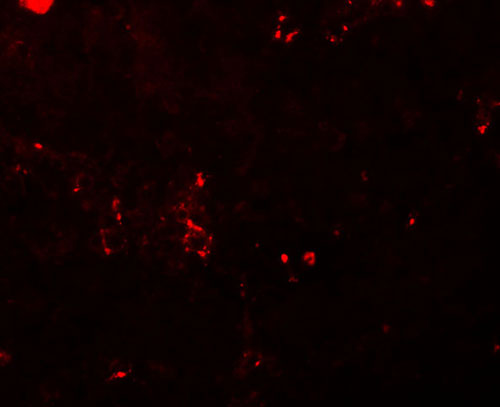BCAS2 Antibody
- SPECIFICATION
- CITATIONS
- PROTOCOLS
- BACKGROUND

Application
| WB, IHC-P, IF, E |
|---|---|
| Primary Accession | O75934 |
| Other Accession | CAG46834, 49457027 |
| Reactivity | Human, Mouse, Rat |
| Host | Rabbit |
| Clonality | Polyclonal |
| Isotype | IgG |
| Calculated MW | 26131 Da |
| Application Notes | BCAS2 antibody can be used for detection of BCAS2 by Western blot at 0.5 - 1 µg/mL. Antibody can also be used for immunohistochemistry starting at 5 µg/mL. For immunofluorescence start at 20 µg/mL. |
| Gene ID | 10286 |
|---|---|
| Target/Specificity | BCAS2; |
| Reconstitution & Storage | BCAS2 antibody can be stored at 4℃ for three months and -20℃, stable for up to one year. As with all antibodies care should be taken to avoid repeated freeze thaw cycles. Antibodies should not be exposed to prolonged high temperatures. |
| Precautions | BCAS2 Antibody is for research use only and not for use in diagnostic or therapeutic procedures. |
| Name | BCAS2 |
|---|---|
| Synonyms | DAM1 {ECO:0000303|PubMed:10403562} |
| Function | Required for pre-mRNA splicing as component of the activated spliceosome (PubMed:28076346, PubMed:28502770, PubMed:29301961, PubMed:29360106, PubMed:30705154). Component of the PRP19-CDC5L complex that forms an integral part of the spliceosome and is required for activating pre-mRNA splicing. May have a scaffolding role in the spliceosome assembly as it contacts all other components of the core complex. The PRP19-CDC5L complex may also play a role in the response to DNA damage (DDR). |
| Cellular Location | Nucleus. Nucleus, nucleolus |
| Tissue Location | Ubiquitously expressed. |

Thousands of laboratories across the world have published research that depended on the performance of antibodies from Abcepta to advance their research. Check out links to articles that cite our products in major peer-reviewed journals, organized by research category.
info@abcepta.com, and receive a free "I Love Antibodies" mug.
Provided below are standard protocols that you may find useful for product applications.
Background
BCAS2 Antibody: BCAS2 was identified through differential display analysis as an mRNA species that was overexpressed in MCF7 and BT-20 breast cancer cell lines. The chromosomal region containing this gene, 1p13.3021, is amplified in these cells lines. BCAS2 is a transcriptional cofactor that enhances estrogen receptor-mediated gene expression, and directly interacts with the tumor suppressor p53 to reduce p53 transcriptional activity by reducing p53 protein level in the absence of DNA damage. Deprivation of BCAS2 through RNA inhibition induces apoptosis in p53-wild type cells, but causes G2-M arrest in p53-null or -mutant cells; this effect was reversed with the expression of ectopic BCAS2. BCAS2 may thus be potentially useful as a therapeutic target in the treatment of cancer.
References
Nagasaki K, Maass N, Manabe T, et al. Identification of a novel gene, DAM1, amplified at chromosome 1p13.3-21 region in human breast cancer cell lines. Cancer Lett.1999; 140:219-26.
Qi C, Zhu YT, Chang J, et al. Potentiation of estrogen receptor transcriptional activity by breast cancer amplified sequence Biochem. Biophys. Res. Commun.2005; 328:393-8.
Huo PC, Tsao YP, Chang HW, et al. Breast cancer amplified sequence 2, a novel negative regulator of the p53 tumor suppressor. Cancer Res.2009; 69:8877-85.
If you have used an Abcepta product and would like to share how it has performed, please click on the "Submit Review" button and provide the requested information. Our staff will examine and post your review and contact you if needed.
If you have any additional inquiries please email technical services at tech@abcepta.com.













 Foundational characteristics of cancer include proliferation, angiogenesis, migration, evasion of apoptosis, and cellular immortality. Find key markers for these cellular processes and antibodies to detect them.
Foundational characteristics of cancer include proliferation, angiogenesis, migration, evasion of apoptosis, and cellular immortality. Find key markers for these cellular processes and antibodies to detect them. The SUMOplot™ Analysis Program predicts and scores sumoylation sites in your protein. SUMOylation is a post-translational modification involved in various cellular processes, such as nuclear-cytosolic transport, transcriptional regulation, apoptosis, protein stability, response to stress, and progression through the cell cycle.
The SUMOplot™ Analysis Program predicts and scores sumoylation sites in your protein. SUMOylation is a post-translational modification involved in various cellular processes, such as nuclear-cytosolic transport, transcriptional regulation, apoptosis, protein stability, response to stress, and progression through the cell cycle. The Autophagy Receptor Motif Plotter predicts and scores autophagy receptor binding sites in your protein. Identifying proteins connected to this pathway is critical to understanding the role of autophagy in physiological as well as pathological processes such as development, differentiation, neurodegenerative diseases, stress, infection, and cancer.
The Autophagy Receptor Motif Plotter predicts and scores autophagy receptor binding sites in your protein. Identifying proteins connected to this pathway is critical to understanding the role of autophagy in physiological as well as pathological processes such as development, differentiation, neurodegenerative diseases, stress, infection, and cancer.




